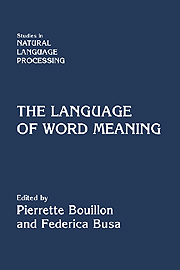Book contents
- Frontmatter
- Contents
- List of Contributors
- Preface
- Introduction: Word Meaning and Creativity
- Part I Linguistic Creativity and the Lexicon
- 1 Introduction
- 2 Chomsky on the Creative Aspect of Language Use and Its Implications for Lexical Semantic Studies
- 3 The Emptiness of the Lexicon: Critical Reflections on J. Pustejovsky's “The Generative Lexicon”
- 4 Generativity and Explanation in Semantics: A Reply to Fodor and Lepore
- 5 The “Fodor”-FODOR Fallacy Bites Back
- Part II The Syntax of Word Meaning
- Part III Interfacing the Lexicon
- Part IV Building Resources
- Index
1 - Introduction
Published online by Cambridge University Press: 07 October 2011
- Frontmatter
- Contents
- List of Contributors
- Preface
- Introduction: Word Meaning and Creativity
- Part I Linguistic Creativity and the Lexicon
- 1 Introduction
- 2 Chomsky on the Creative Aspect of Language Use and Its Implications for Lexical Semantic Studies
- 3 The Emptiness of the Lexicon: Critical Reflections on J. Pustejovsky's “The Generative Lexicon”
- 4 Generativity and Explanation in Semantics: A Reply to Fodor and Lepore
- 5 The “Fodor”-FODOR Fallacy Bites Back
- Part II The Syntax of Word Meaning
- Part III Interfacing the Lexicon
- Part IV Building Resources
- Index
Summary
Lexical semantics has not yet given a satisfactory answer to a crucial question that implicitly or explicitly has been asked by philosophers of language, computer scientists, linguists, and lexicographers, namely, “What is word meaning?” The goal of this part of the volume is to set the stage for subsequent discussion, presenting the issues that confront those investigating language and the mind through the study of the mental lexicon.
The reader should not expect a definite answer. We may gain an insight that word meaning can best be studied as a transparent structure, rather than a black box whose contents escape us. Alternatively, we may choose to take a stand in the debate presented in Chapters 4, 5, and 6, where opposed views are expressed.
There are two broad positions emerging in this part of the volume: One argues for an internal syntax of word meaning (James McGilvray; James Pustejovsky; Yorick Wilks), and the other views concepts as particulars (Jerry Fodor and Ernie Lepore).
McGilvray discusses how word meaning contributes to the creative aspect of language and reaches the conclusion that lexical semantics, as done within a research program such as the Generative Lexicon, is a “branch of syntax, broadly speaking.”
Jerry Fodor and Ernie Lepore criticize lexical semantics frameworks that aim at isolating the internal constitution of word meaning. They forcefully argue against the assumption that the content of concepts is constituted by inferential relations, a view that necessarily leads to holism.
- Type
- Chapter
- Information
- The Language of Word Meaning , pp. 3 - 4Publisher: Cambridge University PressPrint publication year: 2001

